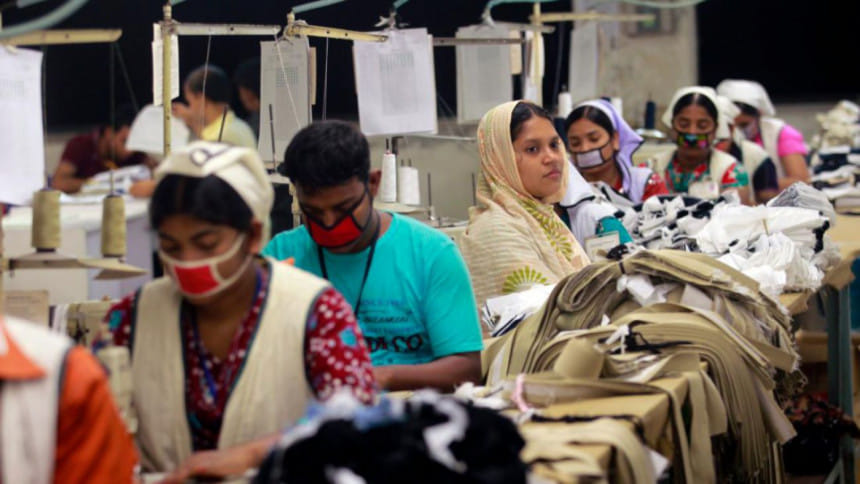The need for equitability

The Bangladesh government proudly promotes the notion that the country is going through a rapid spell of socio-economic development—encapsulated by real GDP growth rates of over seven percent since 2016. We should give credit where it's due. The sectoral diversification instituted by the AL government, in avenues of ICT augmentation and power generation, has contributed to impressive strides in the domestic economy.
Nevertheless, the backbone of our industrial sector remains at the hands of the RMG industry—representing over 80 percent, or above USD 25 billion, of the industrial economy. Therefore, as Bangladesh moves forward in its quest to be an economic powerhouse, it is equally important for the state to ensure that the fundamental economic resource behind these developments—our labour force—is treated equitably and, more importantly, humanely.
Employing over four million workers, the RMG sector is in need of reform due to the longstanding problems of low wages and sub-par labour conditions. This is not to say that certain steps have not been taken—for one, the draft Bangladesh Labour Act 2018 incorporated, in theory, many of the concerns international and domestic stakeholders have regarding labour conditions in the country. The prevalence of top-notch green factories in Bangladesh also adds vibrancy to the idea of sustainable industrialisation. However, there has always been a tendency to sidestep a core issue of labour rights: wages.
Recently, a 51 percent increase in the minimum wage level was announced by the State Minister for Labour and Employment, in response to demands made by trade union activists and other stakeholders to increase wages to USD 215 per month. The increase in the minimum wage level from USD 64 per month to USD 96 per month was met with criticism from human rights and labour organisations. They suggested that the new wage level is simply not enough to sustain the lives of these working-class people.
It has always been somewhat difficult to ascertain the appropriate wage level for Bangladesh's RMG workers. On one end, our comparative advantage—in other words, the ability to produce goods or services at a relatively lower opportunity cost—stems from cheap labour. Whether we like it or not, the reality is that this forms the basis of modern-day Bangladeshi economy, including GDP and employment growth. On the other hand, the prevalence of low wages is a stark reminder of the severe inequalities present in our society. It begs the question as to why we cannot or do not do more for the working class. Increasing wages to an acceptable level therefore is not simply an economic need which ought to be pushed forth to global brands that exploit our workers but is also a fundamental responsibility of the state.
According to the Bangladesh Bureau of Statistics, the per-capita income of the country is expected to reach USD 1,466 this fiscal year. Nevertheless, with the new minimum wage of USD 96 per month, a worker earning the minimum wage throughout the year would be receiving less than what the per-capita income of the country would be. There are those who will suggest that bonuses and other facilities would dictate that these wages will increase to per capita levels by the end of the year but the issue is simply not that. If these workers are contributing the highest output towards total GDP, merely increasing their basic wages to an insufficient level, which nominally has the possibility of falling even below the real income per capita, belittles their efforts.
A crucial problem to real wage growth in the country remains in the inability of the state to reconfigure inflation rates with wage increases. The draft Bangladesh Labour Act 2018 has indeed instituted policies against child labour and in favour of maternity leave provisions—yet questions regarding the need for consistent increases in wages remain. Bangladesh needs a long-term plan to ensure the sustained increase of wage levels on an annual basis—be it through a 10-year policy programme of reviewing and increasing wage levels annually according to percentage changes in inflation, or a long-term scheme of instituting and improving workers' rights policies considering factors beyond wages. A single piece of legislation, without a clear-cut long-term policy plan, cannot solve the numerous impediments. It is the duty of the state and other stakeholders to empower our workers in a manner befitting their dedication and efforts.
Our country is simply not one which provides average quality products to the international market on the basis of cheap labour. It is the chief source for many well-known brands and chains. If we can focus our global marketing on the quality of products that we sell, maybe one day, we can turn the superiority of our products into a marketable advantage. Furthermore, the state has a responsibility to ensure that the ease of doing business for local investors is enhanced and, more importantly, our workers' welfare becomes central to all policymaking.
Mir Aftabuddin Ahmed studied economics and international relations at the University of Toronto. Email: [email protected]

 For all latest news, follow The Daily Star's Google News channel.
For all latest news, follow The Daily Star's Google News channel. 



Comments